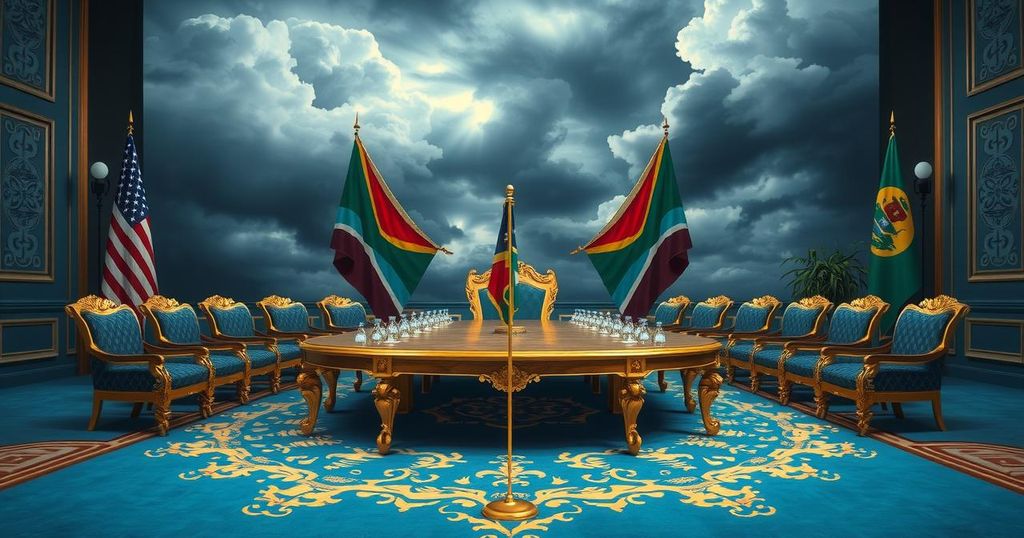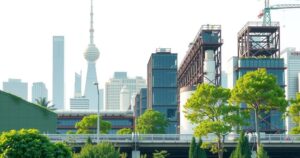High-Stakes Diplomacy: Ramaphosa and Trump’s Meeting in Washington

President Cyril Ramaphosa of South Africa is scheduled to meet U.S. President Donald Trump this week. Tensions arise over land reform narratives and economic sanctions. Trump’s claims of “white genocide” have exacerbated tensions, prompting South Africa’s firm rejection. Economic aid cuts and trade tariffs add to the strained relations, with the G20 Summit on the horizon. The outcome may shape future diplomatic and economic ties between the two nations.
This week, a pivotal meeting is set to take place between South African President Cyril Ramaphosa and U.S. President Donald Trump at the White House. The agenda focuses on bilateral, regional, and global issues that have become increasingly contentious. The backdrop for this high-stakes encounter includes cuts to U.S. aid and significant tensions stemming from South Africa’s controversial land reform legislation, fueled by Trump’s assertions regarding the so-called “white genocide” narratives. Notably, this meeting marks the first time a U.S. administration will host an African leader since Trump’s inauguration in January 2025.
The issue of land reform in South Africa has been a flashpoint, especially since Trump resumed his presidency. Claims that white Afrikaner farmers are facing systemic persecution have been echoed by figures like Elon Musk. In comments made before the meeting, Trump stated, “terrible things are happening” in South Africa. This commentary coincided with Trump’s proposal to grant asylum to Afrikaner farmers asserting they are victims of violence.
Simultaneously, the South African government has firmly rejected these narratives, arguing insufficient evidence supports the notion of any widespread persecution or genocide of Afrikaners. In a display of resilience, President Ramaphosa stated, “As South Africans, we are resilient. We do not run away from our problems… that is a cowardly act.” Many Afrikaner organizations, including AfriForum, have notably distanced themselves from Trump’s asylum proposal, emphasizing their commitment to remain in South Africa.
Elon Musk’s influence has complicated the landscape further. His AI, Grok, has faced criticism for contributing misinformation about South Africa and its dynamics concerning race. Reports show that Grok has injectably referenced “white genocide” during numerous unrelated discussions, prompting backlash and further confusion among users of the platform. Critics, including award-winning journalist Qaanitah Hunter, have expressed concerns about the implications of such misinformation.
Economically, relations between South Africa and the U.S. have been deteriorating. Trump’s executive order earlier this year halted aid to South Africa, alleging unfair confiscation of property among minority groups. This cut has grave implications, especially for the country’s HIV/AIDS programs, which depend on U.S. support. With the country supporting a staggering HIV-positive population, funding cuts threaten to undo years of health advancement.
Trade relations are equally grim, with a 30% tariff placed on South African goods and a staggering 55% on vehicles. Ramaphosa labeled these moves “punitive” and detrimental. The potential reassessment of South Africa’s African Growth and Opportunity Act (AGOA) status adds yet another layer of uncertainty to an already strained economic environment.
The meeting’s outcome will likely influence the upcoming G20 Summit in Johannesburg. South Africa is keen to assert itself as a leader among emerging economies. Trump’s recent snubs, including a possible boycott of the summit, have raised alarms. If the U.S. withdraws, experts suggest it could unintentionally bolster China’s position within the global market.
Further complicating matters, the South African government has taken stances on issues which put it at odds with U.S. policies, such as its recent participation in an International Court of Justice case against Israel. Ramaphosa’s administration has also engaged with Ukraine’s leadership, a move that contrasts with Trump’s often adverse relations with foreign allies. Moreover, tensions were exacerbated earlier this year when the U.S. expelled South African Ambassador Ebrahim Rasool following critical remarks he made about Trump.
As Ramaphosa travels to engage with Trump, the South African government remains hopeful that their invitation stems from a genuine intent to communicate. Still, significant hurdles loom regarding land reform, trade relations, aid limitations, and broader geopolitical complexities.
In summary, the meeting between President Ramaphosa and President Trump could be pivotal not just for South Africa’s immediate future, but also for its long-term relationships, trade policies, and standing in the global arena. Both nations must carefully navigate this delicate diplomatic dance amidst unclear narratives and pressing economic realities.
The imminent Ramaphosa-Trump meeting highlights the complexities of U.S.-South Africa relations amidst growing tensions over the land reform narrative and economic sanctions. While both leaders seek to address pressing bilateral issues, the stakes are high, with consequences not only for their countries but also for geopolitical alignments in the Global South. The outcome of this engagement could shape the forthcoming G20 Summit and beyond, setting a crucial precedent for regional leadership.
Original Source: allafrica.com




